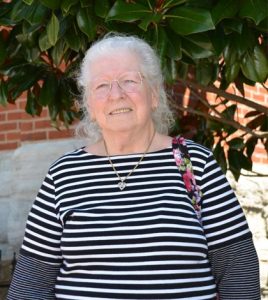Riedel an advocate for senior programs

Billie Reidel
With uncertainty on the minds of many due to yearly state and federal government budget wranglings, it’s no wonder people are concerned.
While health care seems to be one of the most prevalent issues on the agenda, advocates of government assistance programs face concerns that such programs may be overshadowed.
Billie Riedel of Waterloo, a tireless supporter of Programs and Services for Older Persons, wants to put worry on the back burner and take action.
An advocate of programs for the elderly, the frail and those with disabilities, Riedel thinks the more people speak up about programs facing cuts, the better.
“We have to do something now, because it’s going to get worse before it gets better. There are so many people without a voice, and it isn’t just the elderly,” she says.
There are countless websites where citizens can become more informed about what is going on. The National Council on Aging provides updates as well as a large list of programs that could potentially be cut.
“So many people don’t even know there are programs out there that can help, and now many of them might go away,” Riedel said.
While many discussions have led to proposals, it is widely reported that programs such as the Community Development Block Grant and Community Services Block Grant face elimination or restructuring.
Services funded by these grants include Meals on Wheels.
“You know these people don’t just drop off meals. They invest in the lives of those we are helping,” Riedel said. “Sometimes, these volunteers help people get medical attention; something they wouldn’t have gotten if that volunteer hadn’t stopped by with a meal.”
The Department of Health and Human Services could face major reductions and restructuring as well. Although proposals for this department are not specific, HHS provides energy assistance for low-income families, including senior citizens.
HHS also implements and oversees components of the Older Americans Act, which helps fund senior nutrition programs, caregiver support, respite care, information services, elder abuse prevention, and other programs.
Riedel works with Southwestern Illinois College’s Programs and Services for Older Persons, which administers the Senior Companion Program.
She feels there are people who get “swept under the rug” in many cases, especially the elderly and disabled who are homebound.
“There are so many people who are homebound and just can’t get around, and they aren’t always the elderly,” she said.
Riedel said people who are younger and face certain circumstances need help, too.
“We have people who are young, hard workers who are willing to work and who have tried, who still have their electricity cut off or their bills unpaid. These people have children, too. Lots of folks need help,” she said.
The Senior Companion Program helps with federally funded projects for older people, serves frail and older adults as well as families with respite care, assists frail and older veterans, and helps keep the elderly out of nursing homes with an average savings of $92,000 per person, per year.
“People are so grateful when they can stay in their homes, even though we are so thankful for good nursing homes,” Riedel said. “We have kept so many folks at home, and that’s wonderful. I’m afraid for all the people who aren’t going to be able to stay in their homes if some of these budget cuts go through.”
Last year, the local Senior Companion Program logged a total of 109,430 hours. The 132 volunteers assisted 284 frail and older adults and 85 families with respite care.
“There are notices in libraries, nursing homes, churches. We always need more volunteers,” Riedel said.
“So many programs will be impacted if the proposed budget cuts go through. Programs such as Foster Grandparents, RSVP — which assists with environmental projects and natural disasters — and many, many more. A newspaper article can only report the tip of the iceberg. People need to get out and research. They need to call their representatives, write letters, send emails. These programs are needed badly right now.” Riedel said.
SWIC provides information on PSOP and other programs facing cuts. For more information, visit www.swic.edu/community/senior-programs/psop or call 618-234-4410.








